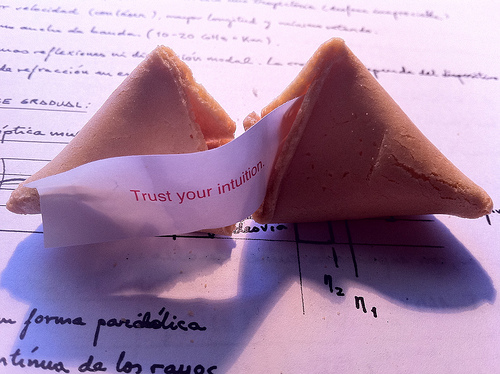Several years ago my strategic partner and good friend Hugh Massie, Founder and CEO of DNA Behavior International, mentioned that he was learning to trust his gut instincts more.
This caught my attention since he is a CPA by training and a very results-oriented, rational person.
Then as I read Malcolm Gladwell’s book, Blink, I learned about this idea of the “second mind,” as he called it. Gladwell raised the visibility of the power of intuition, but I suspect that it was only for a short time for most people.
Using Intuition
Last summer at the National Speakers Association Convention, I met a leadership consultant who was building her speaking platform around the idea that leaders (who have mostly been trained like engineers to trust rationality and disregard feelings) needed to learn to use their intuition more to make better decisions.
Just recently I read another impressive book, THE WAY OF THE SEAL: Think Like an Elite Warrior to Lead and Succeed and was interested to see that author Mark Divine, a former CPA and Navy SEAL, made instinct (awareness of gut feelings) a major theme of the book.
His proposition is that leaders should train like Navy SEALS to intentionally use both rational (conscious mind) and instinctive (drawing from the unconscious mind) inputs to make the best decisions.
Albert Einstein didn’t read Blink, and he certainly wasn’t a Navy SEAL, but evidently, he discovered this related theory early on, saying this:
“The intuitive mind is a sacred gift and the rational mind is a faithful servant. We have created a society that honors the servant and has forgotten the gift.”
I’m seeing a pattern from these different points on the topic of intuition, so let’s explore it a bit deeper.
Examining the Gift of Intuition
Intuition is about listening to your subconscious mind (gut instincts) to pull forward information and feelings that you’ve accumulated over a lifetime. Warriors have to rely on instinct, using every possible sense from outside and every stirring from inside to stay alive.
Having a good visual memory for shapes and landforms is crucial for a military pilot. Being able to store and recall patterns of logic and information is important for an entrepreneur or business person.
Emotional memory is probably the strongest memory that we have, and it’s also the one most quickly accessed. Emotional memory is the one we feel in our gut, and it helps us access the gigabytes of memory stored in our subconscious faster than any processor yet made.
“So, intuition is this stream of awareness that flows from our subconscious to our conscious, but it requires our tuning in to hear the signal.”
Can It Be Learned?
Can intuition be learned? The short answer is yes, but the issue is whether you will develop your awareness and then allow intuition to move from your gut to your mind. It’s not a problem when data is tagged with emotions; it’s ready for quick retrieval and usually easy to access. At other times, it’s as simple as stopping to ask yourself this:
“What is my gut telling me about this—what is my intuition?”
Sometimes data needed for intuition needs help in getting to our awareness, and this situation is where we have to be more intentional about accessing it. It usually means taking time to shut down our rational thinking and reflect usually in a quiet setting away from distractions. Sounds a lot like meditation and prayer, doesn’t it? I believe it’s very similar and can be the same.
Reflecting, waiting, and listening with our feelings for insight is a practice used by wise people throughout the history of civilization.
And it has become a lost art in our increasingly fast-paced society.
If we ignore or fail to cultivate the intuitive half of our decision-making abilities, we become less than our best as leaders and merely rely on the facts at hand.
My Experience With Intuition
I think that I’m a very logical and rational person, but I’ve also been blessed with a gift for patterns and a good memory. In recent years I’ve learned to value what these gifts reveal to me and trust my intuition more.
I do have to be careful about not jumping to conclusions with too little rational information, but overall I’m feeling more confident in my decision-making and greater commitment to execution.
What about you? What has been your experience? How often do you integrate your intuition in your decision-making? Why do you believe that some leaders ignore or don’t develop their intuitive abilities when it would produce better results and greater success? Please share your thoughts and comments.
**********
Never miss an issue of Linked 2 Leadership, subscribe today here!
Learn, Grow & Develop Other Leaders™
Lee Ellis is the Founder & President of Leadership Freedom LLC & FreedomStar Media.
He is a leadership consultant and expert in team building, executive development & assessments
Email | LinkedIn | Web | Blog | Book | Facebook | Twitter
His latest book is called Leading with Honor: Leadership Lessons from the Hanoi Hilton.
Image Sources: katenasser.com


Reblogged this on mariaitliong.
Lee the new science on intuition (which isn’t that new) explains how intuition works which allows you to be more in tune with it. The heart’s intelligence has a lot to do with it so when the emotions are in balance the signal comes in more clearly. My own experience? Once I knew about the three strengths we each have i’ve been better able to sort out what’s intuition from what’s my mental force. Here is the interview I did with Dr. Rollin McCraty, research scientist with HeartMath—pioneers in this field. http://www.management-issues.com/podcasts/85/intuition-mystical-power-or-powerful-tool/
Dawna – thanks for the additional insight. I’m encouraged that many leaders today are choosing to embrace a well-honed, intuitive leadership style. It takes intentional focus and practice to discern clearly, but all leaders can do it. Best to you in your work – LE
Reblogged this on Gr8fullsoul.